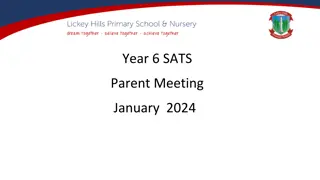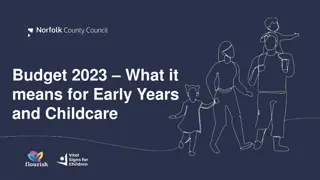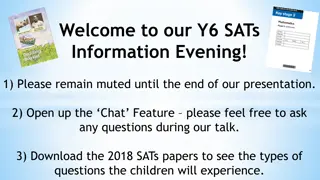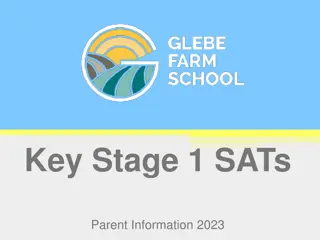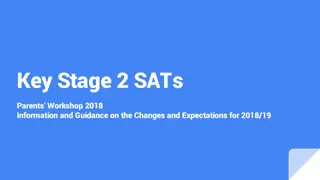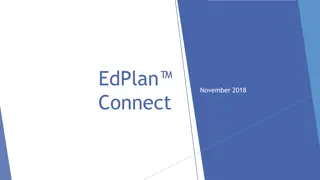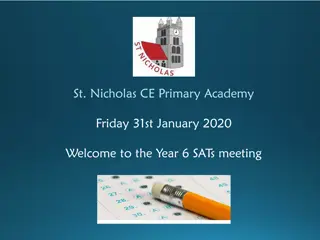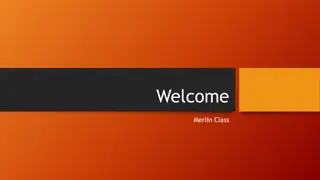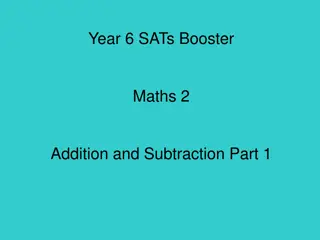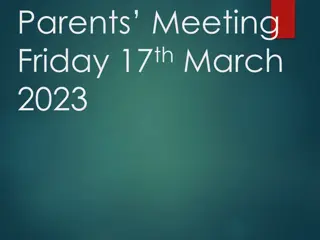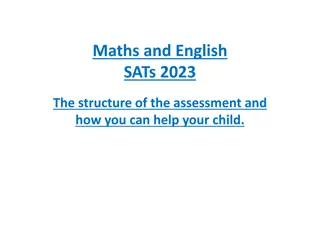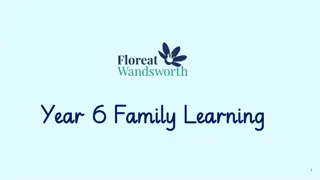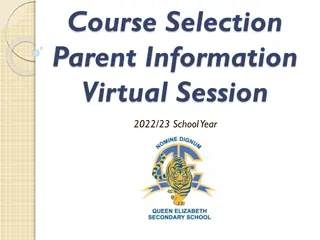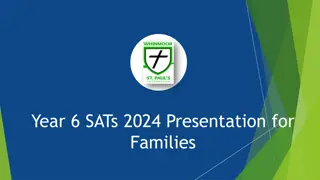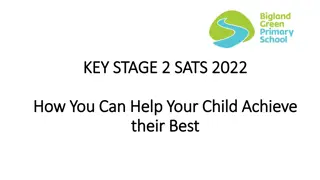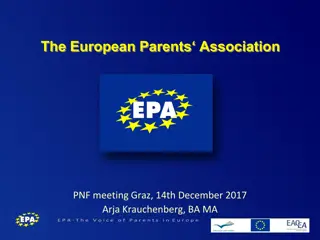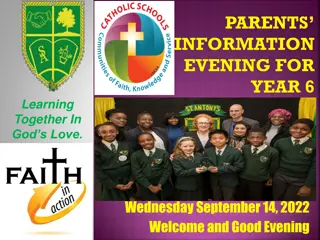Understanding Year 6 SATs in 2024 for Parents: What to Know
Year 6 SATs in 2024 are standardized assessment tests focusing on Maths and English, taken over four days at the end of Key Stage 2. They assess grammar, reading, spelling, arithmetic, and reasoning skills. Results are marked externally and given raw and scaled scores to determine if the National Standard has been met. Positive attitudes and effort are key for children during the testing period.
Download Presentation

Please find below an Image/Link to download the presentation.
The content on the website is provided AS IS for your information and personal use only. It may not be sold, licensed, or shared on other websites without obtaining consent from the author. Download presentation by click this link. If you encounter any issues during the download, it is possible that the publisher has removed the file from their server.
E N D
Presentation Transcript
Year 6 SATs 2024 Information for Y6 Parents
Things to remember about SATs SATs focus on what children know about Maths and English on one day. They will not reflect how talented they are at science, geography, history, art, PE , and they certainly won t highlight all of their amazing personal characteristics. A child s progress is key. Children learn, develop and take leaps forward at different times. Positive attitudes and strong work ethic will take children far in life. 2
What are the SATs? SATs are the Standardised Assessment Tests that are given to children at the end of Key Stage 2. The SATs take place over four days, starting on Monday 13thMay ending on Thursday 16thMay. The SATs papers consist of: Grammar, punctuation and spelling (paper 1: GPS) Monday 13thMay Grammar, punctuation and spelling (paper 2: Spelling) Monday 13thMay Reading Tuesday 14thMay Maths (paper 1: Arithmetic) Wednesday 15thMay Maths (paper 2: Reasoning) Wednesday 15thMay Maths (paper 3: Reasoning) Thursday 16thMay Writing is assessed using evidence collected throughout Year 6. There is no Year 6 SATs writing test. 3
When and how the SATs are completed The tests take place during normal school hours, under exam conditions. After the tests are completed, the papers are sent away to be marked externally. The results are then sent to the school in July. Each test lasts no longer than 60 minutes The majority of children will sit the test in the hall, some in a classroom. 45 minutes 30 minutes 60 minutes 40 minutes 40 minutes Spelling paper = approx. 15 minutes 4
The results Tests are marked externally. Once marked, the tests will be given the following scores: A raw score (total number of marks achieved for each paper); A scaled score (see below); A judgement on if the National Standard has been met. After marking each test, the external marker will convert the raw score to a scaled score. Even though the tests are made to the same standard each year, the questions must be different. This means the difficulty of the tests may vary. Scaled scores ensures an accurate comparison of performance over time. Scaled scores range from 80 to 120. A scaled score of 100 or more shows the pupil is meeting the National Standard. 5
Grammar, Punctuation and Spelling: Monday 13thMay Grammar, punctuation and spelling consists of two papers. Paper 1 focuses on all three elements (grammar, punctuation and spelling or GPS). The paper lasts for 45 minutes. Paper 2 consists of a spelling test only. It should take approximately 15 minutes, although this is not a set amount of time (pupils should be given as much time as they need to complete the test). 6
Grammar, Punctuation and Spelling: Paper 1 (GPS) Accurate punctuation e.g. capital letters/ full stops needed. Example questions: e.g. Although, While e.g. Switch off the lights! Please turn off the lights 7
Grammar, Punctuation and Spelling: Paper 2 (spelling) Paper 2 is a shorter paper that focuses solely on spellings. Example questions: 8
How to help Question your child about their grammar homework Revise old spellings Encourage regular spelling practice on Ed Shed All spellings are on the knowledge organisers online Grammar revision books KS2 SATs 9
Reading: Tuesday 14thMay There is one reading test that lasts for 60 minutes. The test is designed to measure if the children s comprehension of age-appropriate reading material meets the national standard. There are three different set texts for children to read. These could be any combination of non-fiction, fiction and/ or poetry. 10
Reading The reading SATs paper requires a range of answer styles. Question styles include: - Multiple choice questions - One-word answers - Short answer questions - Multiple mark (long answer) questions - Point Prove it 11
Reading Example questions: Based on the whole text Point, prove it Point, prove it 12
Reading 13
How to help? Encourage your child to read daily at home Get them to talk to you about their book Listen to your child read/ read to them Encourage them to have times when they read a page/paragraph quickly scanning the text. What information can they pick up in a minute? How quickly can they find a key word? Question them on what they have read. Example questions to ask at home: - What does this word mean? - Which word in this paragraph is the closest in meaning to ? - What is [character] doing when [event] happened? - True or false questions about a paragraph/ text. - How is the character feeling? How do you know? (point , prove it). - What impression do you get of the character? (point, prove it) 14
Maths: Wednesday 15thand Thursday 16thMay The maths assessments consist of three tests. Paper 1: Arithmetic (30 minutes) Wednesday 15thMay Paper 2: Reasoning (40 minutes) Wednesday 15thMay Paper 3: Reasoning (40 minutes) Thursday 16thMay 15
Y3 , Y4 and Y5 content is also tested as well as concepts learnt in Y6 16
Maths Paper 1 (Arithmetic) The maths arithmetic paper has a total of 40 marks and lasts for 30 minutes. The test covers the four operations (addition, subtraction, multiplication, division, including order of operations requiring BIDMAS), percentages of amounts and calculating with decimals and fractions. Example questions: 17
Maths Paper 1 (Arithmetic) Example 1 mark questions: 4,172 596 x 7 4172 6 4 6.48 + 8.6 . 15.08 1 15.08 Example 2 mark questions: 10% of 3,200 = 320 5% of 3,200 = 160 15% of 3,200 = 480 480 18
Maths Papers 2 and 3 (Reasoning) Paper 2 will take place on Wednesday 15thMay and paper 3 will take place on Thursday 16thMay. These tests have a total of 35 marks each and lasts for 40 minutes each. These papers require children to demonstrate their mathematical knowledge and skills, as well as their ability to solve problems and their mathematical reasoning. They cover a wide range of mathematical topics from key stage 2 including, Number and place value (including Roman numerals); The four operations; Geometry (properties of shape, position and direction); Statistics; Measurement (length, perimeter, mass, volume, time, money); Algebra; Ratio and proportion; Fractions, decimals and percentages. 19
Number & place value, calculations and fractions/decimals and percentages are the 3 big focus areas. 20
Maths Papers (Reasoning) Example questions: 6 10 2.25 21
Maths Papers (Reasoning) Example questions: 22
How to help? For children still wobbly with times tables keep practising online games (hit the button), chanting, TT Rockstars, question them https://mathsbot.com/primary/ks2 KS2 arithmetic practice https://www.mathswithamouse.co.uk/ https://corbettmathsprimary.com/content/ https://www.maths4everyone.com/pages/ks2-sats-practice.php https://www.mathsgenie.co.uk/primary.html the key facts knowledge organiser. Help your child learn the mathematical facts on organisers are on our website. Maths knowledge 23
Maths Breakfast Club All welcome Work through reasoning questions with their friends Croissants/brioche/pan au chocolate available 4 Tuesday mornings 8am EASTER holidays Tuesday 16thApril Tuesday 23rdApril Tuesday 30thApril Tuesday 7thMay 25
Supporting your child in preparing for the SATs Give them as much encouragement as you can. Talk to us if you have any concerns rather than worry your child. Encourage your child to talk to us about their anxieties. Give your child a quiet, distraction free space to complete homework. Fresh air and exercise will support their well being in the run up to SATs Ensure your child is eating and drinking well and getting a good amount of sleep. 26
The week of the SATs Positive and encouraging Early bed times Some anxiety will be normal If it is getting too much, speak to us. Eat well and plenty healthy breakfast Water bottle in school Arrive at school on time (or a few mins early) 27
Advice for Year 6 children The adults you work with all want you to do your best. Everyone in Year 6 has made brilliant progress. Show off what you can do. Get plenty of sleep and eat well: this will help your brain. Read all the questions carefully. This can help you to avoid silly mistakes. Don t panic. There may be questions you think you can t answer. Take a deep breath. Read it again. You can always move on and go back to it later. It s often better to write something rather than nothing. Remember that the Year 6 SATs last for 4 days out of your whole life! They aren t any different to what we have practised in class. You have worked so hard and you are ready for them. 28
Writing Moderation Writing is teacher assessed from work done throughout the year Our judgements are moderated internally by SLT, other local Y6 teachers and often externally by the local authority Judgements: Working towards the expected standard Working at the expected standard Working at the greater depth standard GDS writing is incredibly strong Technically accurate, precise vocabulary and a creative flair 29
After SATs Y6 residential 17th- 20thMay Writing Reading Geography, history, science, DT, computing, PE, music, Spanish, RE, PSHE Maths projects / revision for secondary school Transition work for secondary school Business Enterprise and trip (Alton Towers??) Y6 Water fight / sports / games Y6 leavers service at Manchester Cathedral (children only) Y6 Performance Wizard of OZ (11thand 12thJuly) Y6 leavers church service Thurs 18thJuly AM (parents welcome) Last day parents invited in before the children leave at the end of the day. (details TBC) 30
Business Enterprise Teams Develop an idea to sell and make a profit Team work, problem solving, communication, initiative, leadership skills, concepts such profit, handling money and how a business is run. Dragon s Den Parents shouldn t be out of pocket Selling day in school Profits to be split between charity (children s choice), towards a trip (possibly Alton Towers) and some money comes into school for resources which benefit children across school. 31




